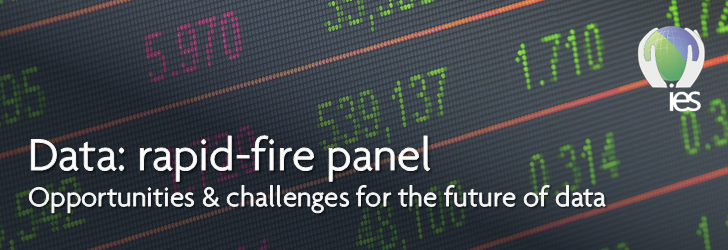Data is a fundamental part of the evidence base upon which environmental science is built.
The past few decades have seen rapid developments in the world of data, significantly changing the landscape of how evidence is collected, curated, and used. Looking to the future, we can expect novel innovations and challenges for data which will influence the future of the environmental sciences.
This rapid-fire panel discussion will bring together expert speakers presenting on emerging developments on data, case studies of best practice, and challenges for the future. Each speaker will provide a short 'lightning' presentation on a different topic linked to data, followed by cross-discussion and questions from attendees.
Presentations will include:
- The rise of infrastructure-level data collection (such as observing networks)
- Real-time environmental monitoring data and air quality
- Machine learning tools and environmental research
- Citizen science and data
This panel discussion has been organised as part of the 'Science' theme of the IES's Future of ES23 horizon scanning & foresight project.
About our speakers
 Professor Ed Hill
Professor Ed Hill
Professor Ed Hill CBE is Chief Executive of the National Oceanography Centre (NOC), one of the world’s most innovative oceanographic institutions. He has a research background in physical oceanography, specialising in the circulation of continental shelf seas and has participated in over 20 research expeditions.
Ed will provide a presentation on the rise of infrastructure-level data collection and observing networks, compared to more traditional project-level data collection.
 Michelle Walker
Michelle Walker
Michelle Walker is Technical Director at The Rivers Trust, leading a team which provides innovative ways of using data and evidence to help understand river environments and deliver river improvements. In particular, she is leading on The Rivers Trust's Citizen Science projects and work against sewage pollution.
Michelle will talk about how citizen science is a key tool in the battle for healthy rivers, including an exciting initiative to develop a national citizen science framework, which aims to democratise data, helping to inform better decision making by NGOs, government and business.
 Martin Rogers
Martin Rogers
Martin Rogers is a machine learning researcher in the British Antarctic Survey (BAS) Artificial Intelligence lab and leads its Artificial Intelligence for Environmental Imagery group. Martin completed his PhD in machine learning and coastal science at the University of Cambridge, and previously worked at the Environment Agency and National Farmers Union.
Martin will discuss the application of machine learning tools to automatically extract sea ice extent and properties from concurrent radar and visible satellite imagery. These outputs are being generated to aid the in-ice navigation of the Sir David Attenborough marine research vessel.
 Tom Reade
Tom Reade
Tom Reade is an Associate Air Quality Consultant at Hilson Moran, an interdisciplinary building engineering consultancy. Tom has an extensive background in local air quality having being involved in the industry for over 11 years.
Tom will provide a presentation on real-time environmental monitoring data and air quality.


